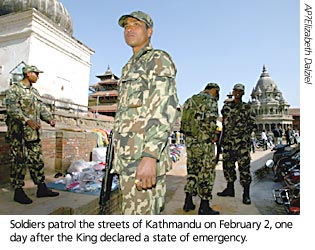New York, February 2, 2005—The Committee to Protect Journalists is deeply concerned about the safety of Nepalese journalists and the censorship of the press following King Gyanendra’s dismissal this week of Nepal’s multi-party government and his declaration of a state of emergency.
“The suspension of civil liberties is a worrisome sign for all citizens, including journalists,” CPJ Executive Director Ann Cooper said today. “Already at great risk from both sides of the conflict between Maoists and the government, journalists are now in danger of the kind of heightened abuse by security forces that marked Nepal’s last state of emergency, when scores of journalists were unjustly detained and often physically abused.”
The king has curtailed basic freedoms, including freedom of the press, the constitutional protection against censorship, and the right against preventive detention, according to a summary of his statement by The Associated Press. He announced his intention to restore a multi-party democracy within three years.
Internet and phone lines have been cut, and Nepal’s news Web sites are out of service.
King Gyanendra’s censorship of the media was evident in the bland coverage produced today by Nepal’s usually outspoken newspapers, according to the BBC. The king’s dismissal of Prime Minister Sher Bahadur Deuba’s government was reported without critical editorial comment.
Security forces have additional powers during the state of emergency, according to the king’s announcement. Even before Tuesday’s declaration of a state of emergency, journalists were at risk of preventive detention and abuse by security forces.
Sitaram Parajuli, executive editor of Kathmandu-based Shram weekly, told CPJ last week that he was taken into custody by security forces on December 28, tortured, and held incommunicado for nearly two weeks. He said he was kicked and shocked with electric currents by security forces interrogating him for information about possible Maoist connections.
During the last state of emergency in Nepal, from November 2001 until August 2002, more than 100 journalists were detained by security forces.
![]()
